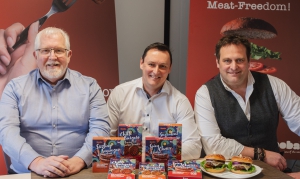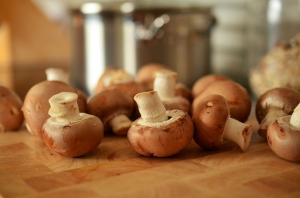PLANT-based burgers and bangers that could “revolutionise” food production in the UK have finally hit the shelves.
MYCO’s pioneering range has been rolled out having been in development for well over a year.
The products are made from Hooba, the Yorkshire firm’s own plant-based protein. Hooba is manufactured under the same roof as Myco’s pioneering vertical farm, where the oyster mushrooms used to create the protein are grown.
This completely unique production process, which results in reduced food miles, has resulted in Myco being heralded as creating ‘Britain’s Greenest Burger’.
Now 10,000 of those burgers – along with 20,000 Hooba sausages – have initially been produced for the long-awaited launch.
“Developing and perfecting these products has been a true labour of love, so to finally bring them to market is an incredibly proud moment,” said Sales Director, Andy Fenner.
“Myco’s team is full of parents and grandparents who want to play their part in giving our planet a future. Humans eat too much meat, so we need to find ways to make swapping it out of our diets a bit more appetising.
“We wanted to manufacture a product that matched meat for texture and taste – and the feedback has been glowing.
“In a blind taste test, our sausages and burgers beat some of the biggest plant-based brands in Britain, and there was high praise for the mouthfeel which, historically, has been one of the big stumbling blocks to people eating less meat.
“Our next goal is to get Hooba onto shelves and tables across the country and let suppliers and customers see how good it tastes for themselves.
“We are over-the-moon that our range is finally packaged and ready to go and given how little impact its production has on our planet, we believe this could revolutionise the way food is manufactured. Our hope is that our sustainable manufacturing process could become a blueprint for the food industry.”
Having already agreed listings with multiple suppliers, including some leading artisanal and plant-based wholesalers, the team have also been in pre-launch discussions with a range of retailers with the view of stocking and using Hooba.
And production will be ramped up considerably over the coming years.
Having appointed former Vbites boss David Wood as CEO, Myco is set to create around 70 jobs following a £1.2m investment earlier this year.
Those jobs will be based at the Leeming Bar production plant, which is the first in Britain to both grow and manufacture a plant-based protein under the same roof.
Source: Myco
Mushroom cultivation produces three times its weight in waste. It’s now being turned into burgers and fertiliser
Cultivating mushrooms produces a lot of waste. For every kilogram of mushrooms produced, about three kilograms of soil-like material containing straw, manure and peat is left behind. In the EU, this results in more than 3 billion kilograms of waste per year.
Managing this waste is a challenge. Although it is rich in organic matter, and therefore useful as compost, used mushroom substrate – the soil-like material – contains a lot of water, which makes it heavy and unprofitable to transport. Some of it is used as compost in agricultural land close by but the vast majority that remains ends up being stored temporarily then landfilled.
‘Every year we have more and more waste,’ said Pablo Martinez, project manager at the Mushroom Technological Research Center of La Rioja in Spain. ‘So, we need larger and larger areas just to manage this waste.’
More mushroom waste could soon be given a second life though thanks to new innovations. Dr Bart van der Burg, Director of Innovation at BioDetection Systems in Amsterdam, the Netherlands, and his team are interested in discarded mushroom parts, such as stems, and deformed mushrooms, which are part of the cultivation leftovers. They are aiming to extract components such as proteins, carbohydrates, fats and chitin – a fibrous substance – from them as part of the Funguschain project. Their goal is to incorporate these extracts into new products such as novel foods, cosmetics and bioplastics. ‘I think we will end up with at least three products coming out of this project,’ said Dr van der Burg.
Read the complete article here!
This article was originally published in Horizon, the EU Research and Innovation magazine and written by Sandrine Ceurstemont.























